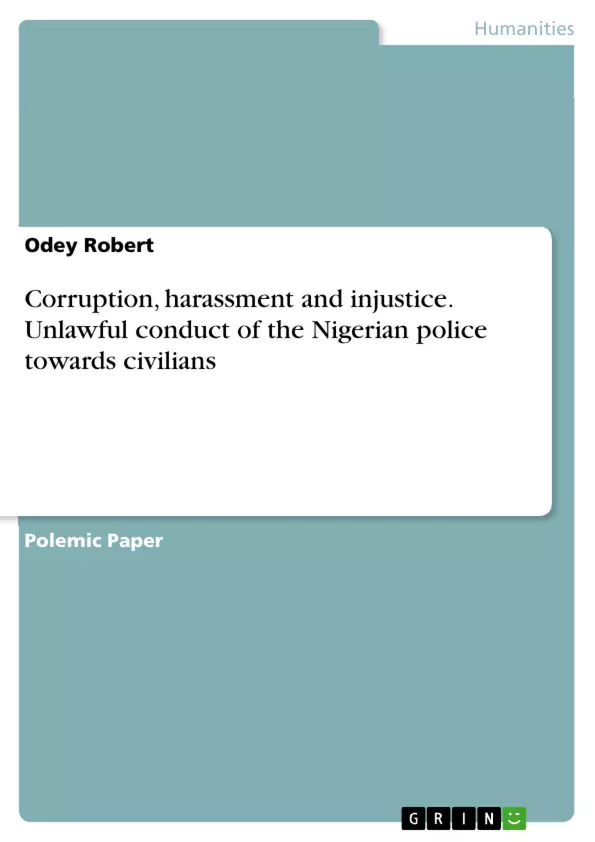It is quite regrettable that police personnel had for long dropped their core duties for the unusual. Corruption is synonymous with them. Civilians beget undue intimidation, harassment, extortion, injustice and jungle justice, molestation, wanton killing and all sorts of plagues from the police. The police have become irresponsible, extremely corrupt and a nuisance. They treat the poor differently from the rich.
What is quite most shocking is the fact that all bids to sanitise the Nigerian Police Force have been futile. This makes one wonder whether the personnel have become above the law, or whether there are no practical measures to address the scourging issues from the police to civilians as well as the society as a whole. These and more have been attested by several studies, scholars and our respondents. Worried by the above issues, which constitute plagues to civilians and the society at a large, this paper rises to examine the plagues, and rouse the attention of the government, police authorities and all to halt these rising issues.
It calls on the government and police authorities in particular to permanently check these issues through efficacious and operational legislations against any unethical and unprofessional acts of police personnel, sparing no defaulters. It also recommends that the Police Acts should be reviewed. The conflict theory of crime and the neo-Marxist political economy approach ground the study.
The study concludes that police plagues are on the increase because the excesses of police personnel are yet to be checked appropriately and duly. The non-participant observation and intuition are the primary sources employed, while textual materials like journals, textbooks, monographs, serials, newspapers, magazines and the internet constitute the secondary sources.
Inhaltsverzeichnis (Table of Contents)
- Introduction
- Police and Policing
- Theoretical Framework
- Neo-Marxist Political Economy Approach
- Conflict Theory of Crime
- History of the Nigerian Police Force
- Police's Plagues and Corruption Effects
- Internal and External Problems of the Police
- Recommendations
- Conclusion
- References
Zielsetzung und Themenschwerpunkte (Objectives and Key Themes)
This paper examines the negative effects of police actions on civilians and society in Nigeria. It explores the causes of these "plagues," including corruption and lack of proper training, and calls for government and police authorities to take action to address these issues.
- Corruption and abuse of power within the Nigerian Police Force
- The impact of police actions on civilians, including intimidation, harassment, and injustice
- The role of societal and political factors in perpetuating police corruption
- The need for systemic reforms and stricter regulations within the Nigerian Police Force
- The importance of professional ethics and training for police officers
Zusammenfassung der Kapitel (Chapter Summaries)
- Introduction: This chapter sets the stage for the study by highlighting the widespread issues of police corruption and its detrimental effects on Nigerian civilians. It also introduces the paper's objective to investigate these issues and advocate for reforms.
- Police and Policing: This chapter provides a brief overview of the Nigerian Police Force, its responsibilities, and its historical context. It discusses the force's reputation for corruption and its impact on public trust and the effectiveness of law enforcement.
- Theoretical Framework: This chapter introduces two theoretical frameworks that guide the study: the Neo-Marxist Political Economy Approach and the Conflict Theory of Crime. These theories provide a lens for analyzing the power dynamics and social inequalities that contribute to police corruption.
- History of the Nigerian Police Force: This chapter explores the historical development of the Nigerian Police Force, examining the origins of its problems and how these problems have evolved over time. It sheds light on the factors that have shaped the force's current state.
- Police's Plagues and Corruption Effects: This chapter delves into the specific ways in which police corruption manifests itself, highlighting the negative consequences for civilians. It includes examples of police brutality, extortion, and arbitrary detention.
- Internal and External Problems of the Police: This chapter examines both internal factors within the police force and external societal pressures that contribute to corruption. It explores issues such as lack of training, poor working conditions, and political interference.
Schlüsselwörter (Keywords)
This study focuses on the issues of police corruption, societal plagues, and their detrimental effects on civilians in Nigeria. It examines the role of the Nigerian Police Force in perpetuating these issues and analyzes the need for reforms to address them. Key terms include Nigerian Police, policing, corruption, plagues, civilians, and police reforms.
Frequently Asked Questions
What are the main issues identified within the Nigerian Police Force?
The study identifies systemic corruption, harassment of civilians, extortion, wanton killings, and a general lack of professional ethics as major plagues within the force.
Which theoretical frameworks are used to analyze police corruption in Nigeria?
The paper employs the Neo-Marxist Political Economy Approach and the Conflict Theory of Crime to explain power dynamics and social inequalities leading to police misconduct.
How does the police force treat the rich versus the poor in Nigeria?
According to the study, there is a significant disparity: the police often treat the poor with intimidation and injustice while being more lenient or protective towards the wealthy.
What reforms are recommended for the Nigerian Police Force?
The author calls for a review of the Police Acts, stricter operational legislation against unethical acts, better training, and improved working conditions to ensure accountability.
What are the primary sources of data for this study?
The study utilizes non-participant observation and intuition as primary sources, complemented by secondary sources like journals, newspapers, and textbooks.
- Citation du texte
- Odey Robert (Auteur), 2017, Corruption, harassment and injustice. Unlawful conduct of the Nigerian police towards civilians, Munich, GRIN Verlag, https://www.grin.com/document/354593



